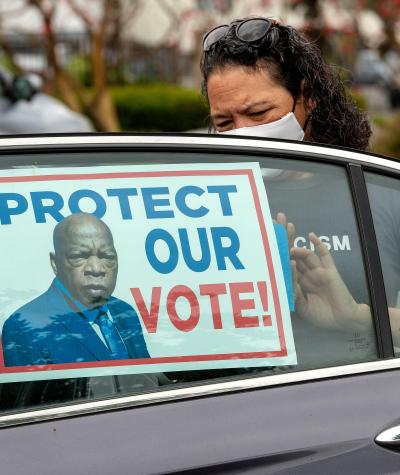The U.S. Senate is pursuing legislation that would protect Americans from racially targeted attacks on their freedom to vote. On Oct. 5, 2021, the U.S. Senate introduced the John Lewis Voting Rights Advancement Act, otherwise known as S. 4 or the VRAA, a bill that would amend and restore the Voting Rights Act of 1965 (VRA).
S. 4 would preserve and expand voting access by ensuring that attempts to create barriers to voting that discriminate against voters based on race, color or national origin get federal review, so we all have an equal say in our future.
The bill’s introduction in the Senate comes after the House passed the John Lewis Voting Rights Advancement Act in August 2021.
The VRA is one of the most successful voting rights laws our country has ever seen. It has a long history of receiving overwhelming bipartisan support in Congress and was most recently reauthorized by the House by a 390-33 vote and in the Senate by a 98-0 vote in 2006 under a Republican president.
During the 2006 reauthorization, Congress held several hearings demonstrating the persistence of racial discrimination in our democracy and the VRA’s continued effectiveness in combatting them.
However, two decisions by the U.S. Supreme Court over the last decade have decreased the ability to protect people from discriminatory measures curtailing their freedom to vote under the VRA.
In the 2013 case Shelby County v. Holder, the Court invalidated the formula used for preclearance, a process that mandated that jurisdictions with long histories of voting discrimination receive approval from the federal government before implementing new voting rules.
Subsequently, many laws have been put in place that prevent communities of color from voting at disproportionately high rates by limiting opportunities for voter validation, closing polling places, deleting voters from state voter rolls, enacting new restrictions on nonpartisan nonprofits from distributing mail ballot applications and reducing the ability to vote early or by mail.
In July 2021, the Court issued another ruling that further damaged the VRA in the case Brnovich v. Democratic National Community, making it more difficult to protect people across the country from racially targeted attacks on their right to vote.
Had the protections afforded by S. 4 been in effect, they would have prevented states from enacting anti-voter laws in 2021. A Campaign Legal Center (CLC) report found that at least four of the states that passed restrictive vote-by-mail and early voting laws this year would have been subject to preclearance under the VRAA.
This would have required them to prove to the Department of Justice (DOJ) or a federal court that their laws did not discriminate against voters of color.
The new formula in the VRAA would subject many of the same states that were covered under the original VRA to preclearance and also expand coverage to some new states not originally included under the VRA.
Additionally, this bill would make it easier to prevent harmful laws from going into effect, mandate that states implement transparency protocols to inform their residents when voting laws in the state are changed and offer new voting protections for Native American tribal lands.
It is the time to restore and strengthen our freedom to vote by eliminating racial discrimination at the ballot box because we all deserve to have a say in the key decisions that will impact our future lives.
The Senate must follow the House’s lead in approving the John Lewis Voting Rights Advancement Act and defending Americans against voting discrimination.
